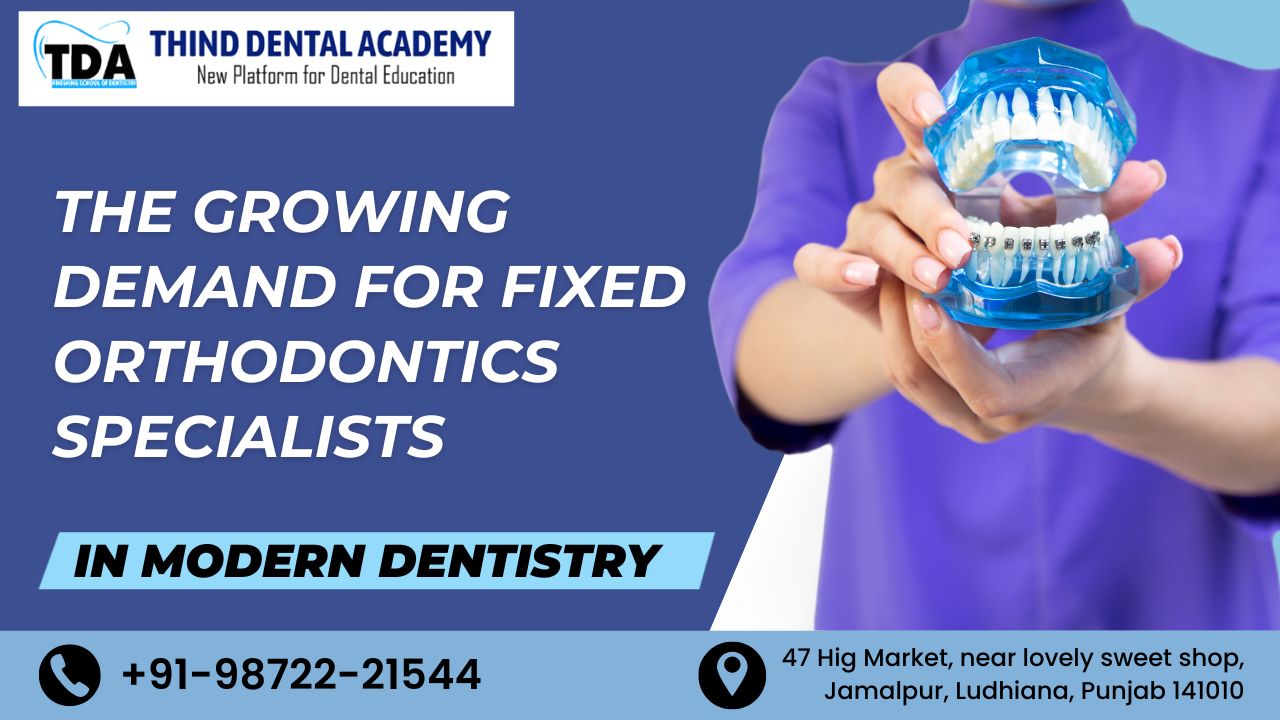
The Growing Demand for Fixed Orthodontics Specialists in Modern Dentistry
The need for orthodontic treatments, particularly fixed orthodontics, is growing in the rapidly changing field of modern dentistry. The demand for qualified orthodontists is rising as more people place a higher value on their smile and general dental health. Specializing in fixed orthodontics offers a special and profitable opportunity for dental professionals seeking to progress in their careers. This blog discusses the ways in which becoming a specialist in fixed orthodontics might revolutionize your dentistry career.
What is Fixed Orthodontics?
Fixed orthodontics are dental treatments that use specialized appliances attached to the teeth and cannot be removed by the patient. These treatments help correct tooth misalignments, bite issues, and jaw problems. Common fixed orthodontics include traditional, ceramic, lingual, and self-ligating braces. Unlike removable aligners, these devices stay on the teeth through the entire treatment, gradually moving the teeth into their desired positions. Fixed orthodontic treatments are ideal for more severe misalignments and offer long-term, effective solutions.
Why is the Demand for Fixed Orthodontics Increasing?
The increasing demand and popularity of fixed orthodontic treatments can be connected to factors such as:
Aesthetic Concerns: A flawless smile is now considered a need for self-image. The demand for fixed orthodontics is rising as more people choose this procedure to improve their smiles.
Functional Advantages: The benefits of fixed orthodontics go beyond appearance. They make chewing and digest food easier, improve speech, and fix bite problems. Additionally, by straightening teeth, they facilitate easier cleaning and dental health maintenance.
Technological Developments: As orthodontics has developed, treatments are quicker, more effective, and more comfortable. People of all ages find braces more appealing because they are now smaller, more discrete, and less apparent.
Enhanced Knowledge: Patients nowadays are better equipped to understand the long-term advantages of orthodontic procedures. Thanks to internet resources, many people now realize that getting orthodontics not only enhances one's beauty but also benefits one's general dental health.
Affordability: A wider range of people can now afford orthodontic treatments thanks to the availability of more reasonably priced solutions.
Role of Fixed Orthodontics Specialists in Modern Dentistry
Patients with dental misalignments can be diagnosed, treated, and managed by highly qualified practitioners who specialize in fixed orthodontics. They do more than just put braces on people. They:
Expert Diagnosis and Treatment Plans: When evaluating the alignment of the teeth and jaw, fixed orthodontic specialists consider both practical requirements and cosmetic objectives. They provide individualized treatment programs according to the needs of each patient.
Advanced Tools and Techniques: Modern tools are used by orthodontists to design extremely accurate, personalized treatment plans that guarantee the best results with the least amount of discomfort.
Collaboration with Other Dental Professionals: In order to provide comprehensive care that addresses all facets of oral health, orthodontists frequently collaborate with general dentists, oral surgeons, and other specialists.
Monitoring Progress: Frequent consultations with the orthodontist enable treatment modifications and refinement, guaranteeing the best possible outcomes.
How to Pursue Specialization in Fixed Orthodontics?
The following procedures should be followed if you're a dentist who wants to specialize in fixed orthodontics:
Get Your Dental Degree: You must obtain the required experience in basic dental practice and earn your general dentistry degree (BDS or equivalent) before you may specialize.
Enroll in a Postgraduate Program: There are numerous orthodontics-specific postgraduate programs available at universities and dentistry schools. These courses offer comprehensive instruction and practical experience in fixed orthodontic procedures.
Become Qualified: To become a qualified orthodontist, you must pass exams after finishing the necessary training. Investigate local standards, as certification may differ by country or region.
Keep Up with Continuing Education: The area of orthodontics is always changing, with new methods and technologies appearing on a regular basis. To stay up to date with the newest developments in fixed orthodontics, it is imperative to attend workshops, seminars, and courses.
To learn more about General Dentistry Courses India, contact Thind Dental Academy.
Conclusion
For dentists hoping to advance in their careers, the rising demand for fixed orthodontics offers an intriguing opportunity. Being an expert in this area puts you at the forefront of contemporary dentistry and enables you to provide worthwhile treatments. As an orthodontic specialist, you will assist individuals in improving their general oral health, enhancing their smiles, and increasing their self-confidence. Fixed orthodontics can be a very fulfilling career path that leads to many opportunities in the dental industry with the correct education and experience. So, if you're ready to take your dentistry career to the next level, obtaining a specialization in fixed orthodontics can be the perfect choice for you.




